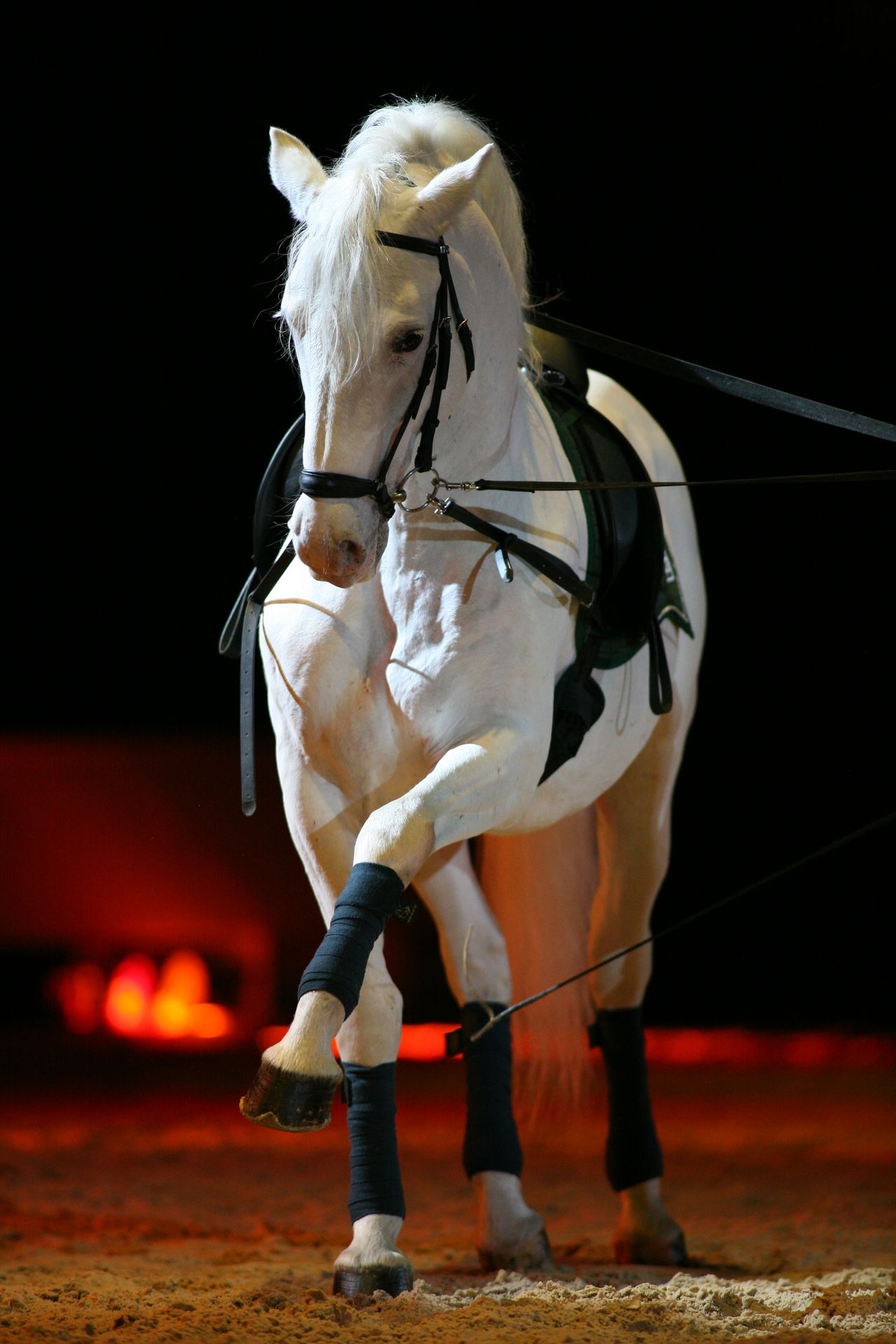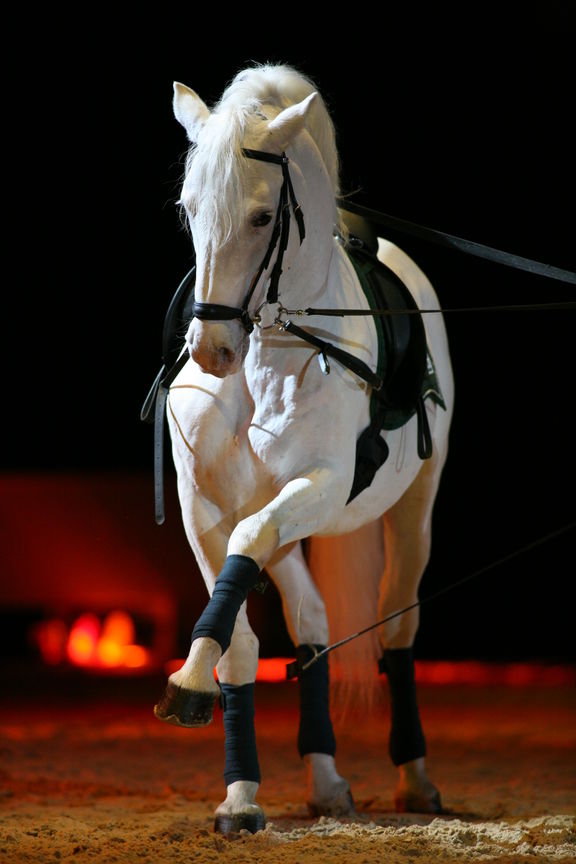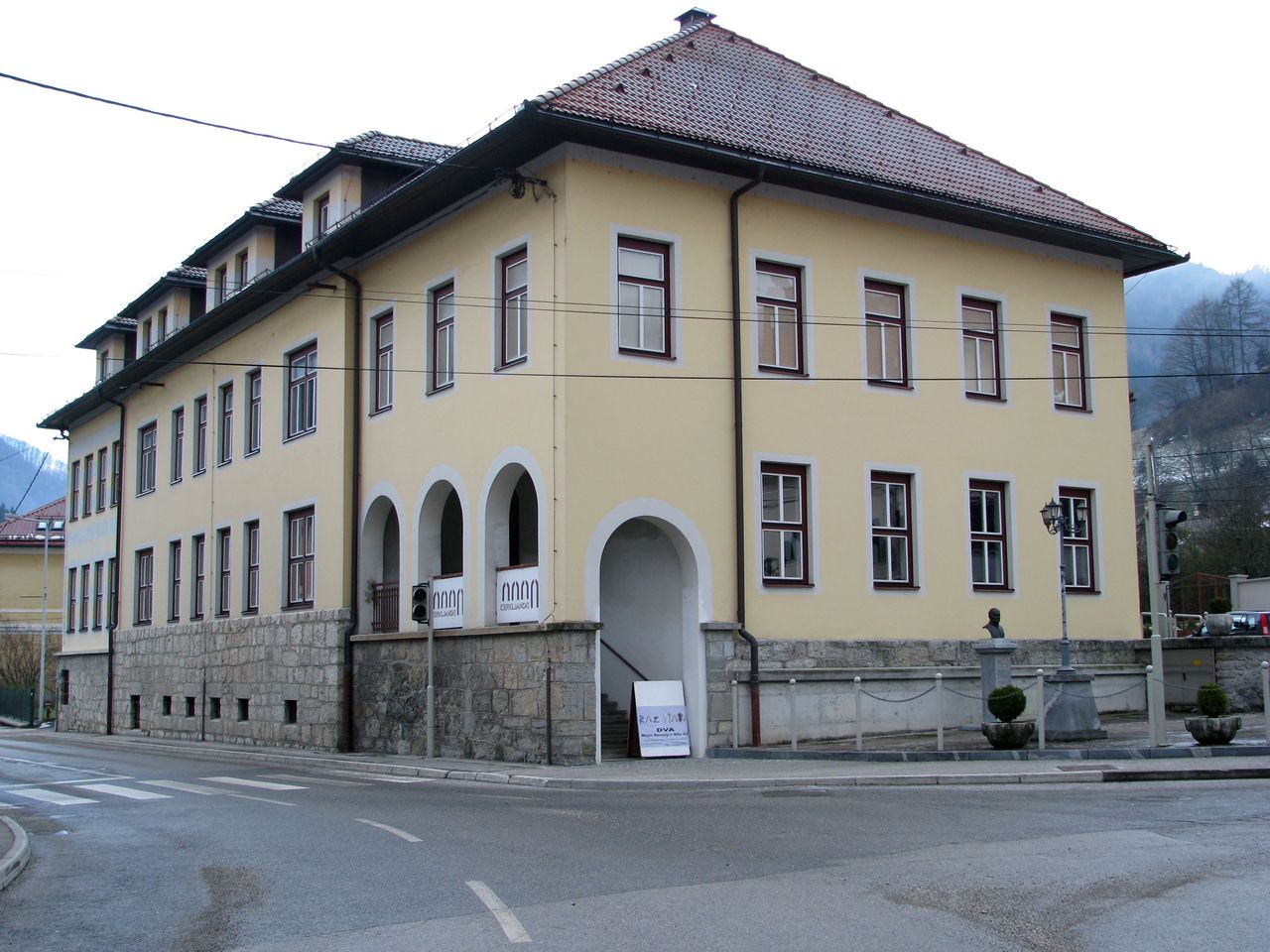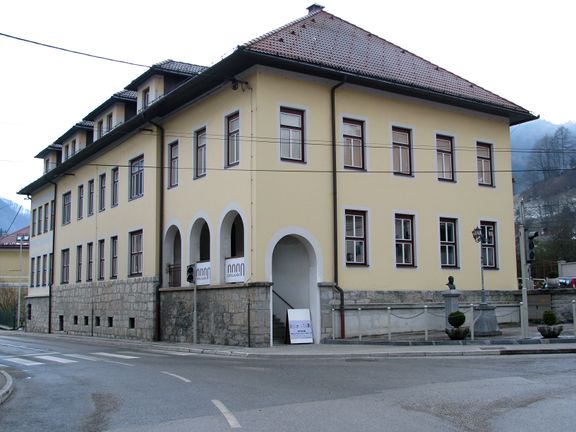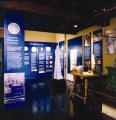Category:Intangible heritage
In Slovenia, intangible heritage is typically divided into the following areas:
- oral traditions and folk literature (e.g., storytelling);
- performances and presentations (theatre, e.g., Škofja Loka Passion Play, singing, instrumental music);
- customs and habits (seasonal customs, e.g., Kurentovanje or Mardi Gras at Cerknica);
- the knowledge and practices concerning the environment;
- traditional craftsmanship (e.g., lacemaking from Idrija, traditional salt-making);
- the cultural environment.
Its safeguarding is based on the UNESCO Convention (2003) and the state law on natural and cultural heritage (2008) and is coordinated by the Slovene Ethnographic Museum.
The National Register of the Intangible Cultural Heritage of Slovenia lists over 80 items, among them: the Škofja Loka Passion Play; the Laufarija in Cerkno; the Procession of the Kurent – Korant; the making of Idrija bobbin lace; Ribnica woodenware; the Traditional production of sea salt; the Traditional breeding and keeping of Lipizzaner horses at the Lipica stud farm; Slovene folk-pop music; the Reading Badge movement; and the Painting beehive panels. See also the list of intangible heritage festivals.
The UNESCO Representative List of the Intangible Cultural Heritage of Humanity also includes the ones related to Slovenia: the Škofja Loka Passion Play (inscribed in 2016); the Door-to-door rounds of Kurenti (2017); the Bobbin LaceMaking (2018); and the Art of dry stone walling, knowledge and techniques (Croatia, Cyprus, France, Greece, Italy, Slovenia, Spain and Switzerland) (2018).
External links
- The National Register of the Intangible Cultural Heritage of Slovenia
- Lists of Intangible Cultural Heritage and the Register of Good Safeguarding Practices
-
to
5 Sep 2025
28 Sep 2025
SlovakiaHlohovecHomeland Museum in HlohovecThe exhibition "Slovenian-Slovak dimension" presents the cultural-historical as well as contemporary similarities and differences between two countries – Slovakia and Slovenia.
Promoted by: Embassy of the Republic of Slovenia in Bratislava. -
to
12 Sep 2024
22 Sep 2024
USAClevelandSlovenian DaysSlovenian Days 2024 will be celebrated with a series of educational and entertaining cultural events for all ages. These events are brought to you by the Consulate General of the Republic of Slovenia in Cleveland, Ohio, along with many partners within the Slovenian community. All events are open to the public, and guests of all ages are welcome. Events will include a concert by Oktet Jurij Dalmatin; presentation of the exhibition "Us and Them Without Frontiers"; Reflections in the Slovenian Cultural Garden; Dedication of the Sister Cities Flags, Centennial celebration of Cleveland's Slovenian National Home, and many others.
-
to
13 Jun 2024
30 Sep 2024
Bosnia and HerzegovinaSarajevoEx-YU Rock Centar SarajevoOpening of an exhibition "Slovenian Rock - Slovenski rock". Organised by Embassy of the Republic of Slovenia in Sarajevo in honour of Slovenian Statehood Day.
-
6 Jun 2024
Bosnia and HerzegovinaSarajevoSarajevo Youth TheatreSarajevo Wine WeekendA projection of "Terra Magica", a documentary about viticulture and winemaking in Slovenian region Goriška Brda. Organised and promoted by Embassy of the Republic of Slovenia in Sarajevo.
-
1 Jun 2024
CroatiaZagrebPark RibnjakZagreb PrideSlovenian vocalist and harpist Raiven will be performing live at the Zagreb Pride Parade.
-
28 May 2024
AustriaViennaInstitut für Osteuropäische Geschichte Universitätscampus WienA projection of "Snatched from the Source - Zajeti v izviru: Slovenski otroci Lebensborna", a documentary film about last living Slovenian victims of the Nazi racial experiment: Ingrid von Oelhafen, Hay Henry Hayder, Franc Zagožen, and Ivan Acman. After the projection, there will be a talk with the director Maja Weiss, the writer Nataša Konc Lorenzutti and professor Marija Wakounig from the University of Vienna. In collaboration with Institut für Osteuropäische Geschichte der Universität Wien and Bela Film.
-
11 Apr 2024
GermanyBerlinMuseum Europäischer KulturenThe exhibition "Buzzing Slovenia: About Bees and people" will be concluding with an international symposium "Bees for Peace - Čebele za mir". Amongst the speakers will be Kristina Seljak, the curator of Museum of Apiculture, Radovljica, and Gorazd Trušnovec, president of Slovene Urban Beekeepers' Association. The events are held in honor of the World Bee Day and the symposium is organised by Museum Europäischer Kulturen, Embassy of the Republic of Slovenia in Berlin and Slovenian Cultural Centre in Berlin.
-
1 Mar 2024
NetherlandsHagueHaagse Kunstkring GalleryThe evening features a wide range of Slovenian music performed by young Slovenian musicians: singer Lana Petrovič, flutist Neža Zupanc, pianist Miha Gantar, bassist Gašper Livk, and drummer Domen Cizej. The concert is supported by the Embassy of the Republic of Slovenia in The Hague.
-
16 Feb 2024
Czech RepublicBrnoFaculty of Economics and Administration of Masaryk UniversityOn the occasion of Slovene Cultural Holiday, Prešeren Day, a projection of documentary film "Czech House and Czech-Slovene collaboration" by Ladislav Jirásko, with Czech House caretaker and alpinist Drejc Karničar in attendance. Organised by Slovene-Czech Society and Embassy of the Republic of Slovenia in Prague.
-
to
27 Nov 2023
10 Dec 2023
ArgentinaCordobaCabildo de CordobaExhibition "Intangible Cultural Heritage of Slovenia in the Light of Unesco Convention", prepared by custodians Nena Židov and Anja Jerin of Slovene Ethnographic Museum. Co-organised by Embassy of the Republic of Slovenia in Buenos Aires.
Articles in category "Intangible heritage"
The following 34 pages are in this category, out of 34 total.
D
I
S
Media in category "Intangible heritage"
The following 47 files are in this category, out of 47 total.
- Cerkno Museum 2008 Permanent exhibition Photo Tomaz Lauko (2).jpg 4,352 × 3,264; 2.19 MB
- Cerkno Museum 2008 Permanent exhibition Photo Tomaz Lauko (3).jpg 4,352 × 3,264; 3.44 MB
- Cerkno Museum 2008 Permanent exhibition Photo Tomaz Lauko (4).jpg 4,352 × 3,264; 2 MB
- Cerkno Museum 2008 Permanent exhibition Photo Tomaz Lauko.jpg 4,352 × 3,264; 3.03 MB
- Idrija Lace Festival 2007 Contemporary fashion design exhibition Photo Jani Peternelj.jpg 3,687 × 1,844; 2.88 MB
- Idrija Lace Festival 2007 Footwear design by Ana Novak Photo Jani Peternelj.jpg 2,592 × 3,872; 487 KB
- Idrija Lace Festival 2007 Installation Photo Jani Peternelj (2).jpg 2,008 × 3,000; 3.81 MB
- Idrija Lace Festival 2007 Installation Photo Jani Peternelj.jpg 3,872 × 2,592; 664 KB
- Idrija Lace Festival 2008 replica of tablecloth Photo Jani Peternelj.jpg 3,872 × 2,592; 4.51 MB
- Idrija Lace Festival demonstration by students Photo Jani Peternelj.jpg 3,331 × 2,230; 4.94 MB
- Kurentovanje 2023 Carnival events for children Photo Stanko Kozel.jpg 1,901 × 1,267; 712 KB
- Kurentovanje 2023 Faries at the opening procession Photo Stanko Kozel.jpg 3,000 × 2,000; 1.21 MB
- Kurentovanje 2023 Kurent group Photo Stanko Kozel.jpg 1,800 × 1,200; 1.03 MB
- Kurentovanje 2023 Kurents at the Ptuj Ring monument Photo Stanko Kozel.jpg 2,048 × 1,366; 1.14 MB
- Kurentovanje 2023 Kurents' door-to-door rounds Photo Stanko Kozel.jpg 2,120 × 1,342; 1.04 MB
- Kurentovanje 2023 Kurents Opening ethno procession Photo Stanko Kozel.jpg 1,024 × 682; 108 KB
- Kurentovanje 2023 Mardi Gras Photo Stanko Kozel.jpg 1,280 × 821; 179 KB
- Kurentovanje 2023 Meet the indigenous carnival characters Photo Stanko Kozel.jpg 1,280 × 853; 181 KB
- Kurentovanje 2023 Meet traditional carnival characters Ploughmen Photo Stanko Kozel.jpg 6,000 × 4,000; 4.25 MB
- Kurentovanje 2023 Opening ethno procession Photo Stanko Kozel.jpg 1,024 × 682; 123 KB
- Kurentovanje 2023 Shrove Tuesday and Burial Shrove Photo Stanko Kozel.jpg 1,280 × 853; 117 KB
- Kurentovanje 2023 the Devil with Kurents Photo Stanko Kozel.jpg 2,376 × 1,584; 1.32 MB
- Lipica Stud Farm 2004 Pastures.jpg 1,280 × 960; 488 KB
- Lipica Stud Farm 2005 Lipizzaner horses.jpg 2,448 × 3,264; 5.01 MB
- Lipica Stud Farm 2008 Classical Riding School Photo Dalibor Gregor.jpg 3,008 × 2,000; 2.97 MB
- Lipica Stud Farm 2008 Classical Riding School Photo Patrick Dome.jpg 2,912 × 4,368; 4.22 MB
- Lipica Stud Farm 2011 Lipizzaner horses.jpg 4,288 × 2,848; 2.92 MB
- Ljutomer Trotter Museum 2014 trotter.jpg 2,677 × 2,009; 3.16 MB
- Loka Museum 1998 permanent exhibition.jpg 1,696 × 1,757; 2.79 MB
- Museum of Salt Making Secovlje 2020 Entrance Photo Kaja Brezocnik.jpg 2,048 × 1,365; 1,011 KB
- Museum of Salt Making Secovlje 2020 Exterior Photo Kaja Brezocnik (1).jpg 2,048 × 1,365; 840 KB
- Museum of Salt Making Secovlje 2020 Exterior Photo Kaja Brezocnik (2).jpg 2,048 × 1,365; 906 KB
- Museum of Salt Making Secovlje 2020 Exterior Photo Kaja Brezocnik (3).jpg 2,048 × 1,365; 868 KB
- Museum of Salt Making Secovlje 2020 Exterior Photo Kaja Brezocnik (4).jpg 2,048 × 1,365; 1.02 MB
- Museum of Salt Making Secovlje 2020 Secovlje Regional Park Photo Kaja Brezocnik (1).jpg 2,048 × 1,365; 1.28 MB
- Museum of Salt Making Secovlje 2020 Secovlje Regional Park Photo Kaja Brezocnik (2).jpg 2,048 × 1,365; 610 KB
- Museum of Salt Making Secovlje 2020 Secovlje Regional Park Photo Kaja Brezocnik (3).jpg 2,048 × 1,365; 945 KB
- Museum of Salt Making Secovlje 2020 Secovlje Regional Park Photo Kaja Brezocnik (4).jpg 2,048 × 1,365; 894 KB
- Museum of Salt Making Secovlje 2020 Secovlje Regional Park Photo Kaja Brezocnik (5).jpg 2,048 × 1,365; 824 KB
- Museum of Salt Making Secovlje 2020 Secovlje Regional Park Photo Kaja Brezocnik (6).jpg 2,048 × 1,365; 1.18 MB
- Museum of Salt Making Secovlje 2020 Secovlje Regional Park Photo Kaja Brezocnik (7).jpg 2,048 × 1,370; 1.01 MB
- Museum of Salt Making Secovlje 2020 Secovlje Regional Park Photo Kaja Brezocnik (8).jpg 2,048 × 1,365; 727 KB
- National competition in lacemaking at the Idrija Lace Festival - Photo Jani Peternelj.jpg 3,331 × 2,230; 3.87 MB


